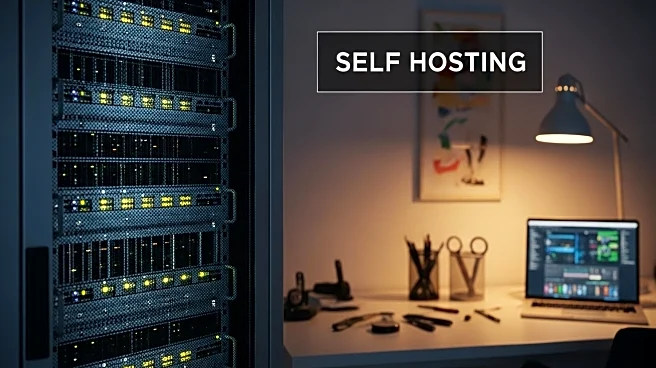What's Happening?
A tech enthusiast shares insights on the practice of self-hosting applications, a method where individuals run software on their own hardware instead of relying on cloud services. The article highlights the author's journey since 2009, emphasizing the control and customization self-hosting offers. The author uses various applications like Nextcloud for personal notes and Immich as a Google Photos alternative, illustrating the potential cost savings compared to cloud storage. However, self-hosting requires a significant initial investment and ongoing maintenance, including updates and security measures. The author notes that while self-hosting provides freedom from corporate control and subscription fees, it also demands technical skills and time commitment.
Why It's Important?
The discussion on self-hosting is significant as it reflects a growing trend among tech-savvy individuals seeking greater control over their digital lives. This approach can lead to substantial cost savings and enhanced privacy, as users manage their own data security. However, it also highlights the challenges of maintaining such systems, which can be a barrier for those without technical expertise. The trend could influence the software industry, pushing for more user-friendly self-hosting solutions or encouraging cloud services to offer more customizable and transparent options. The balance between convenience and control is a critical consideration for users deciding between self-hosting and traditional cloud services.
What's Next?
As self-hosting gains popularity, there may be increased demand for tools and platforms that simplify the process, making it accessible to a broader audience. Companies might respond by developing more intuitive self-hosting solutions or enhancing cloud services to offer similar levels of customization and privacy. Additionally, the community around open-source software could grow, providing more resources and support for individuals interested in self-hosting. The ongoing debate between convenience and control will likely continue to shape the digital landscape, influencing both consumer choices and industry offerings.
Beyond the Headlines
The self-hosting movement raises important questions about data ownership and privacy in the digital age. As more individuals take control of their data, there could be broader implications for how personal information is managed and protected. This shift might also impact regulatory discussions around data privacy and security, as self-hosting challenges traditional models of data management. Furthermore, the skills developed through self-hosting could contribute to a more tech-literate society, empowering individuals to engage more critically with technology.








